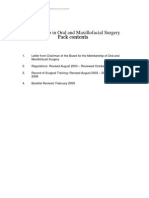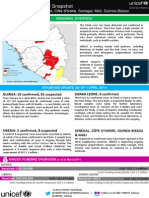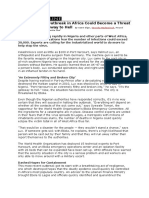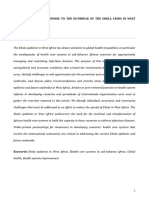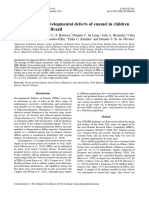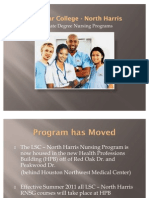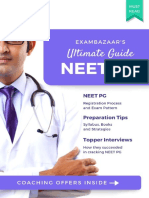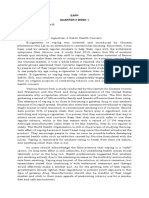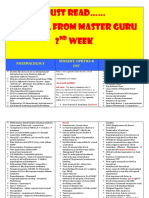Press Release: Life-Saving Information Helps Reduce Spread of Ebola Across West Africa
Uploaded by
api-235121531Press Release: Life-Saving Information Helps Reduce Spread of Ebola Across West Africa
Uploaded by
api-235121531PRESS RELEASE
Life-saving information helps reduce spread of Ebola across West Africa
DAKAR, Senegal, 10 April 2014 Together with Ministries of Health and other partners across seven countries in West Africa, UNICEF is using text messaging through mobile phones, radio shows, TV programmes and door-to-door campaigns to disseminate life-saving information in an effort to contain the often-fatal Ebola virus. Most of the people in this part of the world had never heard of Ebola before, said Dr. Guido Borghese, UNICEF Principal Advisor Child Survival and Development for West and Central Africa. In this environment, unfounded fears and rumours spread quickly and widely. More than ever, it is crucial that families have both the means and the right information to protect themselves and prevent dangerous misunderstandings. In collaboration with partners such as the Red Cross and the World Health Organization (WHO), UNICEF is stepping up efforts to design culturally-sensitive communication strategies and raise awareness of Ebola, at the grassroots level, across the seven at-risk or affected countries in West Africa. In Guinea, Liberia, Sierra Leone, Cote d'Ivoire, Senegal, Mali and Guinea Bissau, mass and digital media and inter-personal communication activities are being carried out to prevent people contracting the Ebola virus amongst communities and health workers in mosques, churches, schools, health centres and markets. Additionally, UNICEF is providing critical prevention supplies, such as soap, chlorine, and gloves to the people in affected communities across West Africa. West Africa is witnessing its first major outbreak of Ebola, which has no vaccine and no cure. The disease has already claimed 111 lives in Guinea and neighbouring Liberia as of 8 April 2014. In total, a growing number of 178 suspected, probable and confirmed cases has been reported in Guinea and Liberia, as well as six suspected cases in Mali. Radio dramas, print materials, TV shows, and even voice messages are automatically sent to mobile phones -- we use every appropriate means of communication to reach more people, spread the word in local languages and save lives, adds Borghese. We are running against time to avoid further spread in West Africa. Ebola kills people; but more lives are put at risk because of lack of information or misinformation though rumours, stressed Borghese. There is no existing vaccine against Ebola. Bringing patients with suspected symptoms to health centres as soon as possible increases their chances of survival and prevents other people from getting infected. UNICEF is urgently appealing for US$1.2 million for Guinea and almost US$1.3 million for neighbouring countries including Liberia, Sierra Leone, Senegal, Guinea Bissau and Mali, to provide disinfectant products, essential medicines, life-saving supplies and communication support crucially needed to stop Ebola from spreading further across West Africa. ###
Notes to editors In Guinea, UNICEF and partners are communicating life-saving information about the disease door-to-door and distributing posters and leaflets. In Liberia, UNICEF has worked with telecommunications companies to send out 500,000 text messages about Ebola. Across Liberia, Sierra Leone, Senegal and Cote dIvoire, UNICEF is taking part in local radio shows. In Cote d'Ivoire, in addition to hygiene equipment, UNICEF has supported health districts in the region of Man with four tents that have been set up as isolation centres. In Mali, UNICEF is helping to develop communication messages around hygiene practices to be disseminated through community radio networks in the affected regions. In the most-affected areas of Guinea including the capital Conakry, UNICEF has distributed 77,400 bottles of liquid chlorine, more than 300,000 bars of soap, 150,000 pairs of gloves, 670 sprayers and 1,650kg of Calcium Hypochlorite (HCH) to medical workers and communities. In Liberia, UNICEF has provided seven cholera kits, eight large tents to establish isolation units, 15,360 pieces of soap, 725 kg of chlorine and disinfectant products, 100 basic family water kits, 4,830 boxes of disinfectant, over 9,200 buckets and 2,360 jerry cans. In addition, UNICEF is supplying national and local health authorities in Sierra Leone, Cote dIvoire, Senegal and Mali with prevention medical equipment, including soap, gloves, tents, hygiene kits and two large isolation units, required to help contain and prevent Ebola. About UNICEF UNICEF promotes the rights and wellbeing of every child, in everything we do. Together with our partners, we work in 190 countries and territories to translate that commitment into practical action, focusing special effort on reaching the most vulnerable and excluded children, to the benefit of all children, everywhere. For more information about UNICEF and its work visit: www.unicef.org Follow us on Twitter and Facebook Download multimedia content at: http://weshare.unicef.org/mediaresources For more information, please contact: Laurent Duvillier, UNICEF in Dakar, Tel (+221) 77 740 35 77, lduvillier@unicef.org Timothy La Rose, UNICEF in Conakry, Tel (+224) 622 350 251, tlarose@unicef.org Kent Page, UNICEF New York, Tel: 1-212-326-7605; Cell: 1-917-302-1735; kpage@unicef.org Georgina Thompson, UNICEF New York, Tel: 1-212-326-4516; Cell: 1-917-775-3874; gthompson@unicef.org
You might also like
- EBOLA: Sub-Regional Snapshot: Guinea, Liberia, Sierra Leone, Côte D'ivoire, Senegal, Mali, Guinea-BissauNo ratings yetEBOLA: Sub-Regional Snapshot: Guinea, Liberia, Sierra Leone, Côte D'ivoire, Senegal, Mali, Guinea-Bissau2 pages
- Newsnote: UNICEF Fights Ebola Outbreak Amidst Child Deaths in GuineaNo ratings yetNewsnote: UNICEF Fights Ebola Outbreak Amidst Child Deaths in Guinea2 pages
- UNICEF Guinea COVID-19 Situation Report No. 9 - 27 May To 9 June 2020No ratings yetUNICEF Guinea COVID-19 Situation Report No. 9 - 27 May To 9 June 20205 pages
- UNICEF Guinea COVID-19 Situation Report No. 8. As of 26 May 2020No ratings yetUNICEF Guinea COVID-19 Situation Report No. 8. As of 26 May 20205 pages
- UNICEF Guinea COVID-19 Situation Report No.2No ratings yetUNICEF Guinea COVID-19 Situation Report No.23 pages
- News Note: Schools in Liberia To Reopen Following Return of More Than 1 Million Students in GuineaNo ratings yetNews Note: Schools in Liberia To Reopen Following Return of More Than 1 Million Students in Guinea2 pages
- News Note: Schools in Liberia To Reopen Following Return of More Than 1 Million Students in GuineaNo ratings yetNews Note: Schools in Liberia To Reopen Following Return of More Than 1 Million Students in Guinea2 pages
- UNICEF Guinea COVID-19 Situation Report No. 7 - 29 April-12 May 2020No ratings yetUNICEF Guinea COVID-19 Situation Report No. 7 - 29 April-12 May 20205 pages
- Ebola Virus Disease (Evd) Update: Country Case Definition Cases DeathsNo ratings yetEbola Virus Disease (Evd) Update: Country Case Definition Cases Deaths2 pages
- Gavi COVID 19 Situation Report 8 05052020No ratings yetGavi COVID 19 Situation Report 8 050520207 pages
- News Note: EMBARGO: 10 A.M. GMT / 11 A.M. CET/5:00 A.M. EST Friday, 6 February 2015No ratings yetNews Note: EMBARGO: 10 A.M. GMT / 11 A.M. CET/5:00 A.M. EST Friday, 6 February 20152 pages
- How The Ebola Outbreak in Africa Could Become A Threat To Europe Gateway To HellNo ratings yetHow The Ebola Outbreak in Africa Could Become A Threat To Europe Gateway To Hell3 pages
- The International Response To The Outbreak of The Ebola Crisis in West AfricaNo ratings yetThe International Response To The Outbreak of The Ebola Crisis in West Africa77 pages
- DR Congo - 2018 Ebola Outbreak in Equateur Province: People in Affected Areas Affected Health ZonesNo ratings yetDR Congo - 2018 Ebola Outbreak in Equateur Province: People in Affected Areas Affected Health Zones1 page
- UNICEF Ghana COVID19 Situation Report No 6 16 30 June 2020No ratings yetUNICEF Ghana COVID19 Situation Report No 6 16 30 June 20209 pages
- Ebola Response in Rural Sierra Leone Not Yet Rapid EnoughNo ratings yetEbola Response in Rural Sierra Leone Not Yet Rapid Enough4 pages
- Humanitarian Quality Assurance - Sierra Leone: Evaluation of Oxfam's Humanitarian Response To The West Africa Ebola CrisisNo ratings yetHumanitarian Quality Assurance - Sierra Leone: Evaluation of Oxfam's Humanitarian Response To The West Africa Ebola Crisis2 pages
- Humanitarian Quality Assurance - Sierra Leone: Evaluation of Oxfam's Humanitarian Response To The West Africa Ebola CrisisNo ratings yetHumanitarian Quality Assurance - Sierra Leone: Evaluation of Oxfam's Humanitarian Response To The West Africa Ebola Crisis2 pages
- Humanitarian Quality Assurance - Sierra Leone: Evaluation of Oxfam's Humanitarian Response To The West Africa Ebola CrisisNo ratings yetHumanitarian Quality Assurance - Sierra Leone: Evaluation of Oxfam's Humanitarian Response To The West Africa Ebola Crisis2 pages
- Humanitarian Quality Assurance - Sierra Leone: Evaluation of Oxfam's Humanitarian Response To The West Africa Ebola CrisisNo ratings yetHumanitarian Quality Assurance - Sierra Leone: Evaluation of Oxfam's Humanitarian Response To The West Africa Ebola Crisis2 pages
- Humanitarian Quality Assurance - Sierra Leone: Evaluation of Oxfam's Humanitarian Response To The West Africa Ebola CrisisNo ratings yetHumanitarian Quality Assurance - Sierra Leone: Evaluation of Oxfam's Humanitarian Response To The West Africa Ebola Crisis2 pages
- Humanitarian Quality Assurance - Sierra Leone: Evaluation of Oxfam's Humanitarian Response To The West Africa Ebola CrisisNo ratings yetHumanitarian Quality Assurance - Sierra Leone: Evaluation of Oxfam's Humanitarian Response To The West Africa Ebola Crisis2 pages
- Humanitarian Quality Assurance - Sierra Leone: Evaluation of Oxfam's Humanitarian Response To The West Africa Ebola CrisisNo ratings yetHumanitarian Quality Assurance - Sierra Leone: Evaluation of Oxfam's Humanitarian Response To The West Africa Ebola Crisis2 pages
- Humanitarian Quality Assurance - Sierra Leone: Evaluation of Oxfam's Humanitarian Response To The West Africa Ebola CrisisNo ratings yetHumanitarian Quality Assurance - Sierra Leone: Evaluation of Oxfam's Humanitarian Response To The West Africa Ebola Crisis2 pages
- Humanitarian Quality Assurance - Sierra Leone: Evaluation of Oxfam's Humanitarian Response To The West Africa Ebola CrisisNo ratings yetHumanitarian Quality Assurance - Sierra Leone: Evaluation of Oxfam's Humanitarian Response To The West Africa Ebola Crisis2 pages
- Humanitarian Quality Assurance - Sierra Leone: Evaluation of Oxfam's Humanitarian Response To The West Africa Ebola CrisisNo ratings yetHumanitarian Quality Assurance - Sierra Leone: Evaluation of Oxfam's Humanitarian Response To The West Africa Ebola Crisis2 pages
- Humanitarian Quality Assurance - Sierra Leone: Evaluation of Oxfam's Humanitarian Response To The West Africa Ebola CrisisNo ratings yetHumanitarian Quality Assurance - Sierra Leone: Evaluation of Oxfam's Humanitarian Response To The West Africa Ebola Crisis2 pages
- Humanitarian Quality Assurance - Sierra Leone: Evaluation of Oxfam's Humanitarian Response To The West Africa Ebola CrisisNo ratings yetHumanitarian Quality Assurance - Sierra Leone: Evaluation of Oxfam's Humanitarian Response To The West Africa Ebola Crisis2 pages
- Humanitarian Quality Assurance - Sierra Leone: Evaluation of Oxfam's Humanitarian Response To The West Africa Ebola CrisisNo ratings yetHumanitarian Quality Assurance - Sierra Leone: Evaluation of Oxfam's Humanitarian Response To The West Africa Ebola Crisis2 pages
- Humanitarian Quality Assurance - Sierra Leone: Evaluation of Oxfam's Humanitarian Response To The West Africa Ebola CrisisNo ratings yetHumanitarian Quality Assurance - Sierra Leone: Evaluation of Oxfam's Humanitarian Response To The West Africa Ebola Crisis2 pages
- Humanitarian Quality Assurance - Sierra Leone: Evaluation of Oxfam's Humanitarian Response To The West Africa Ebola CrisisNo ratings yetHumanitarian Quality Assurance - Sierra Leone: Evaluation of Oxfam's Humanitarian Response To The West Africa Ebola Crisis2 pages
- Humanitarian Quality Assurance - Sierra Leone: Evaluation of Oxfam's Humanitarian Response To The West Africa Ebola CrisisNo ratings yetHumanitarian Quality Assurance - Sierra Leone: Evaluation of Oxfam's Humanitarian Response To The West Africa Ebola Crisis2 pages
- Humanitarian Quality Assurance - Sierra Leone: Evaluation of Oxfam's Humanitarian Response To The West Africa Ebola CrisisNo ratings yetHumanitarian Quality Assurance - Sierra Leone: Evaluation of Oxfam's Humanitarian Response To The West Africa Ebola Crisis2 pages
- Humanitarian Quality Assurance - Sierra Leone: Evaluation of Oxfam's Humanitarian Response To The West Africa Ebola CrisisNo ratings yetHumanitarian Quality Assurance - Sierra Leone: Evaluation of Oxfam's Humanitarian Response To The West Africa Ebola Crisis2 pages
- Humanitarian Quality Assurance - Sierra Leone: Evaluation of Oxfam's Humanitarian Response To The West Africa Ebola CrisisNo ratings yetHumanitarian Quality Assurance - Sierra Leone: Evaluation of Oxfam's Humanitarian Response To The West Africa Ebola Crisis2 pages
- Humanitarian Quality Assurance - Sierra Leone: Evaluation of Oxfam's Humanitarian Response To The West Africa Ebola CrisisNo ratings yetHumanitarian Quality Assurance - Sierra Leone: Evaluation of Oxfam's Humanitarian Response To The West Africa Ebola Crisis2 pages
- Humanitarian Quality Assurance - Sierra Leone: Evaluation of Oxfam's Humanitarian Response To The West Africa Ebola CrisisNo ratings yetHumanitarian Quality Assurance - Sierra Leone: Evaluation of Oxfam's Humanitarian Response To The West Africa Ebola Crisis2 pages
- Humanitarian Quality Assurance - Sierra Leone: Evaluation of Oxfam's Humanitarian Response To The West Africa Ebola CrisisNo ratings yetHumanitarian Quality Assurance - Sierra Leone: Evaluation of Oxfam's Humanitarian Response To The West Africa Ebola Crisis2 pages
- Humanitarian Quality Assurance - Sierra Leone: Evaluation of Oxfam's Humanitarian Response To The West Africa Ebola CrisisNo ratings yetHumanitarian Quality Assurance - Sierra Leone: Evaluation of Oxfam's Humanitarian Response To The West Africa Ebola Crisis2 pages
- Humanitarian Quality Assurance - Sierra Leone: Evaluation of Oxfam's Humanitarian Response To The West Africa Ebola CrisisNo ratings yetHumanitarian Quality Assurance - Sierra Leone: Evaluation of Oxfam's Humanitarian Response To The West Africa Ebola Crisis2 pages
- Humanitarian Quality Assurance - Sierra Leone: Evaluation of Oxfam's Humanitarian Response To The West Africa Ebola CrisisNo ratings yetHumanitarian Quality Assurance - Sierra Leone: Evaluation of Oxfam's Humanitarian Response To The West Africa Ebola Crisis2 pages
- Humanitarian Quality Assurance - Sierra Leone: Evaluation of Oxfam's Humanitarian Response To The West Africa Ebola CrisisNo ratings yetHumanitarian Quality Assurance - Sierra Leone: Evaluation of Oxfam's Humanitarian Response To The West Africa Ebola Crisis2 pages
- Humanitarian Quality Assurance - Sierra Leone: Evaluation of Oxfam's Humanitarian Response To The West Africa Ebola CrisisNo ratings yetHumanitarian Quality Assurance - Sierra Leone: Evaluation of Oxfam's Humanitarian Response To The West Africa Ebola Crisis2 pages
- Humanitarian Quality Assurance - Sierra Leone: Evaluation of Oxfam's Humanitarian Response To The West Africa Ebola CrisisNo ratings yetHumanitarian Quality Assurance - Sierra Leone: Evaluation of Oxfam's Humanitarian Response To The West Africa Ebola Crisis2 pages
- Humanitarian Quality Assurance - Sierra Leone: Evaluation of Oxfam's Humanitarian Response To The West Africa Ebola CrisisNo ratings yetHumanitarian Quality Assurance - Sierra Leone: Evaluation of Oxfam's Humanitarian Response To The West Africa Ebola Crisis2 pages
- News Note: EMBARGO 00:01 GMT 27 NovemberNo ratings yetNews Note: EMBARGO 00:01 GMT 27 November2 pages
- Statement: UNICEF Calls For Immediate Release of Abducted School Girls in Chibok, Borno State, NigeriaNo ratings yetStatement: UNICEF Calls For Immediate Release of Abducted School Girls in Chibok, Borno State, Nigeria2 pages
- Key Developments:: UNICEF Central African Republic (CAR) Flash UpdateNo ratings yetKey Developments:: UNICEF Central African Republic (CAR) Flash Update2 pages
- In CAR Capital, Bangui, UNICEF and Partners Are Setting Up Temporary Classrooms For Over 20,000 Displaced ChildrenNo ratings yetIn CAR Capital, Bangui, UNICEF and Partners Are Setting Up Temporary Classrooms For Over 20,000 Displaced Children3 pages
- Press Release: UNICEF Provides Emergency Supplies To Treat Children Injured in Central African Republic FightingNo ratings yetPress Release: UNICEF Provides Emergency Supplies To Treat Children Injured in Central African Republic Fighting2 pages
- UNICEF and Its Partners Respond To A Resurgence of Malaria Cases in ChadNo ratings yetUNICEF and Its Partners Respond To A Resurgence of Malaria Cases in Chad2 pages
- Key Figures: Children and AIDS: Sixth Stocktaking Report, 2013No ratings yetKey Figures: Children and AIDS: Sixth Stocktaking Report, 20132 pages
- Press Release: UNICEF Gears Up To Help Over 500,000 Malian Children Return To SchoolNo ratings yetPress Release: UNICEF Gears Up To Help Over 500,000 Malian Children Return To School2 pages
- Press Release: Central African Republic: UNICEF Calls For An Investigation Into The Alleged Killings of ChildrenNo ratings yetPress Release: Central African Republic: UNICEF Calls For An Investigation Into The Alleged Killings of Children2 pages
- Reasons For Extraction of Primary Teeth in Jordan-A Study.: August 2013No ratings yetReasons For Extraction of Primary Teeth in Jordan-A Study.: August 20135 pages
- Human Herpesviruses: Christopher Downing, Natalia Mendoza, Karan Sra and Stephen K. TyringNo ratings yetHuman Herpesviruses: Christopher Downing, Natalia Mendoza, Karan Sra and Stephen K. Tyring45 pages
- 16 Eu Truclear 5c Brochure en 1424040 PrintqualityNo ratings yet16 Eu Truclear 5c Brochure en 1424040 Printquality4 pages
- A To Z Orthodontics. Volume 9: Preventive and Interceptive OrthodonticsNo ratings yetA To Z Orthodontics. Volume 9: Preventive and Interceptive Orthodontics38 pages
- Factores de Riesgo para Defectos Del Desarrollo Del EsmalteNo ratings yetFactores de Riesgo para Defectos Del Desarrollo Del Esmalte4 pages
- LSC-North Harris Info Session PowerPointNo ratings yetLSC-North Harris Info Session PowerPoint38 pages
- Morning Report September, 10 2015: Supervisor: Dr. Agus Thoriq, Spog DM Jaga: RianNo ratings yetMorning Report September, 10 2015: Supervisor: Dr. Agus Thoriq, Spog DM Jaga: Rian15 pages
- Attending Physicians Statement-Death ClaimNo ratings yetAttending Physicians Statement-Death Claim2 pages
- Inflammatory Gingival Enlargement and Management: A Case ReportNo ratings yetInflammatory Gingival Enlargement and Management: A Case Report4 pages
- Schwartz M. William. Pedoman Klinis Pediatri. Jakarta: Penerbit Buku Kedokteran. ECG. 2005No ratings yetSchwartz M. William. Pedoman Klinis Pediatri. Jakarta: Penerbit Buku Kedokteran. ECG. 20052 pages


